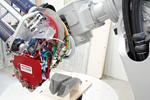Thermolysis launches RCF brand supporting recycled carbon fiber product development
Taiwan-based company offers rCF product design and development with significant CO2 emission reductions and certified material traceability.

Source | Thermolysis Co. Ltd.
Thermolysis Co. Ltd. (Taichung City, Taiwan), dedicated to creating products that can be entirely recycled, has announced its socially responsible brand, RCF, which designs and develops a range of bike accessories — like bottle cages, pads, seats, cycling shoe boards, light stands and fenders — and daily necessities using carbon fiber recycled via the thermolysis process.
The company reports that its carbon fiber regeneration process is ISO 14067 certified, emitting only one-fifth of the CO2 emissions emitted when making new fiber. Statistics show that producing one ton of new carbon fiber typically results in about 20-40 tons of CO2 emissions. Thermolysis’ certification in 2023 by TÜV Rheinland, however, showed that each kilogram of its recycled carbon fiber (rCF) only emits 5.047 kilograms of CO2 equivalent.
Since 2022, Thermolysis has also achieved UL 2809 certification to verify the origin of its rCF material waste. This ensures full transparency and traceability of material history.
Thermolysis specializes in the production of rCF. Founded in 2016, it focuses on continuous innovation, especially in developing and integrating high-temperature thermal treatment systems for rCF. Since 2020, the company has been building rCF and regeneration factory lines, engaging in its processing and production.
To grow the rCF market, Thermolysis says it plans to expand applications to high-value added products. Besides large-scale rCF production, the company supports downstream needs in the carbon fiber industry by designing and manufacturing rCF paper and nonwoven materials (rCF prepregs, intermediate laminates and pipe product lines) and rCF pellets (ideal for injection processes). These products can be used in both thermosetting and thermoplastic processes.
Related Content
-
Cryo-compressed hydrogen, the best solution for storage and refueling stations?
Cryomotive’s CRYOGAS solution claims the highest storage density, lowest refueling cost and widest operating range without H2 losses while using one-fifth the carbon fiber required in compressed gas tanks.
-
Plant tour: Teijin Carbon America Inc., Greenwood, S.C., U.S.
In 2018, Teijin broke ground on a facility that is reportedly the largest capacity carbon fiber line currently in existence. The line has been fully functional for nearly two years and has plenty of room for expansion.
-
Plant tour: Albany Engineered Composites, Rochester, N.H., U.S.
Efficient, high-quality, well-controlled composites manufacturing at volume is the mantra for this 3D weaving specialist.
















